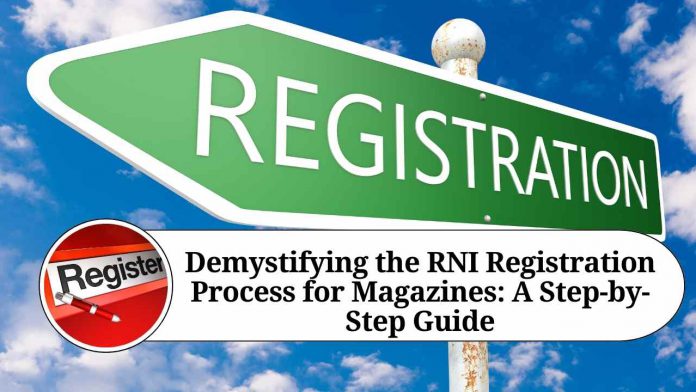Introduction
For magazine publishers in India, registering with the Registrar of Newspapers for India (RNI) is a crucial step to ensure legal compliance and establish credibility. The RNI registration grants publishers the status of a “newspaper” or “magazine” and provides a unique registration number. In this blog post, we will guide you through the RNI registration process specifically for magazines, outlining the necessary steps and documents required.
Step 1: Determine Eligibility
Before proceeding with the registration process, it’s important to ensure that your publication meets the eligibility criteria set by the RNI. To qualify as a magazine, your publication must be published periodically (at least once every three months) and contain original content. Additionally, the magazine should have a title, a distinctive number, and a nameplate.
Step 2: Choose the Appropriate Category
The RNI offers two categories for magazine registration:
- Indian Language Magazines: Magazines published in regional languages fall under this category. It’s important to specify the language in which the magazine will be published during the registration process.
- English Language Magazines: If your magazine will be published solely in the English language, this is the appropriate category to choose.
Step 3: Gather Required Documents
To initiate the registration process, you need to prepare a set of documents. Here’s a checklist of the essential documents:
- Duly filled and signed Form I: This form can be obtained from the RNI office or downloaded from their official website. Provide accurate details about the publication, including the title, periodicity, language, address of the publishing office, etc.
- Declaration by the publisher: A notarized declaration on a non-judicial stamp paper confirming compliance with the Press and Registration of Books Act, 1867.
- Affidavit by the publisher: Another notarized affidavit confirming that the publication will not violate any laws or contain defamatory content.
- Demand draft: Prepare a demand draft for the prescribed fee payable to the “Registrar of Newspapers for India.” The fee structure may vary, so it’s advisable to visit the RNI website or contact the office for the latest fee details.
- Certificate of incorporation: In case the magazine is published by a company, provide a copy of the certificate of incorporation.
- Copies of previous issues: Submit at least five consecutive copies of the magazine’s previously published issues to establish its periodicity.
- Declaration of circulation: Prepare a declaration indicating the proposed circulation of the magazine, stating the number of copies printed and distributed.
Step 4: Submission and Follow-up
After gathering the required documents, submit them to the RNI office either in person or via registered post. Ensure that all documents are properly organized and arranged as per the RNI guidelines.
Once submitted, you can follow up with the RNI office for updates on the registration process. The timeline for approval can vary, so it’s important to maintain regular communication with the authorities.
Conclusion
Registering your magazine with the RNI is an essential step to ensure legality and credibility. By carefully following the steps outlined above and providing all the necessary documents, you can simplify the RNI registration process for your magazine. Remember to stay updated with the latest guidelines and requirements from the RNI to ensure a smooth registration experience. Once registered, you can focus on delivering quality content to your readers and growing your publication.
Read more useful content:
Frequently Asked Questions (FAQs)
Q1: What is RNI registration for magazines?
A1: RNI registration is the process through which magazines in India obtain legal recognition and a unique registration number from the Registrar of Newspapers for India.
Q2: Is RNI registration mandatory for magazines?
A2: Yes, RNI registration is mandatory for all magazines published in India to ensure compliance with the Press and Registration of Books Act, 1867.
Q3: What are the eligibility criteria for magazine registration?
A3: To be eligible for RNI registration, magazines must be published periodically (at least once every three months), contain original content, have a title, a distinctive number, and a nameplate.
Q4: How do I choose the appropriate category for magazine registration?
A4: The RNI offers two categories for magazine registration: Indian Language Magazines and English Language Magazines. Choose the category based on the language in which your magazine is published.
Q5: What are the essential documents required for RNI registration?
A5: The essential documents include a filled and signed Form I, a declaration and an affidavit by the publisher, a demand draft for the prescribed fee, a certificate of incorporation (if applicable), copies of previous issues, and a declaration of circulation.
Q6: Where can I obtain Form I for RNI registration?
A6: Form I can be obtained from the RNI office or downloaded from their official website.
Q7: How do I submit the RNI registration documents?
A7: You can submit the documents either in person at the RNI office or through registered post, as per your convenience.
Q8: What is the fee for RNI registration?
A8: The fee for RNI registration varies, so it’s advisable to check the RNI website or contact the office for the latest fee details.
Q9: How long does it take to get RNI registration for a magazine?
A9: The timeline for RNI registration approval can vary. It’s recommended to maintain regular communication with the RNI office for updates on the status of your registration.
Q10: What is the significance of RNI registration for magazines?
A10: RNI registration provides legal recognition to magazines, establishes their credibility, and allows them to enjoy the benefits and protections provided by the Press and Registration of Books Act, 1867. It also helps in maintaining transparency in the publishing industry.




















